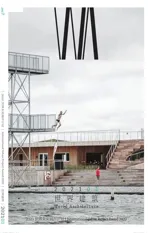柏林漂浮“大学”,柏林,德国
2021-01-26建筑设计柏林空间实验室
建筑设计:柏林空间实验室

1 夜景/Night view
2018年,柏林空间实验室启动了柏林漂浮“大学”这一项目,该项目为一临时的市区实验室,用作集体体验学习和跨学科交流。场地在1930年代早期设计为雨水收集池,为坦普尔霍夫机场服务,并作为一个功能齐全的基础设施保留至今。60多年不曾向公众开放以后,各种各样的动物、植物和藻类已在此生根并孕育出独特的景观:一种被自然回收的人造环境中,污水与相对较新的教学实验室共存,形成一种自然文化1)或第三景观2)。
在2008年坦普尔霍夫机场关闭后,该市的重建计划建议将水池迁移到环绕着新开发项目的300hm2公园中。不过,在2014年坦普尔霍夫公投中,柏林人投票反对城市规划,并阻止机场进行任何形式的建设。这次公投的结果不仅保护了独特的市区绿地,也为该雨水收集池提供了保护。
漂浮“大学”成立一年以来,见证了各种各样的游客不同程度地参与现场活动,创建了一个独特的生态系统。将一个教学实验室安排在此,是一种深思熟虑的政治参与形式。2018年4-9月,漂浮“大学”邀请了学生、教授、夏令营及自组织团体等各类群组在这个场地进行他们的课程和实验。除了邀请各机构来此摆脱各自僵化甚至严苛的框架之外,还通过提供广泛的活动项目,包括戏剧表演、自行车越野、养蜂工作室等开放企划与公众生活结合。
该企划巩固了实践者的社交网络,并在2018年底决定继续试验,从“临时”项目过渡到一个协会组织:漂浮协会。
正是为了维护这个场所的历史,并延续城市开发的非官方叙事,漂浮协会确立了自己的职责:开放、维护并悉心照料这片独特的区域,同时将自发性的、基金的合作项目推向公众。换言之,这是一个学习去参与、去拥抱和驾驭世界的错综复杂,并去想象和创造不同生活形式的地方。3)[1](吉利·卡列夫斯基、罗萨里奥·塔莱维 文,庞凌波 译)
In 2018, Floating UniversityBerlin was initiated by raumlabor as a temporary inner-city laboratory for collective, experiential learning and transdisciplinary exchange. The site was designed in the early 1930s as a rainwater retention basin to serve the Tempelhof airfield and remains as a fully functioning infrastructure. Having been closed off to the public for over 60 years, a diverse range of animals, plants and algae have taken root and given birth to a unique landscape: a manmade environment reclaimed by nature where polluted water coexists with the relatively new presence of this pedagogical experiment, forming a natureculture1)or a third landscape2).
After the Tempelhof airport closed down in 2008,the city's redevelopment plan proposed to relocate the basin as a pond positioned within 300 hm2of parkland,surrounded by new development. However, in the Tempelhof referendum of 2014, Berliners voted against the city plans and prevented any kind of construction on the air field. The result of this referendum not only protected the unique inner-city green space, but also provided protection for the basin.
The founding year of the Floating University saw a diverse breadth of visitors involved to varying degrees with the activity on site, creating a unique ecosystem. Situating a pedagogical experiment in this location was a deliberate form of political engagement. From April to September of 2018, the Floating University invited varied constellations of students, professors, summer schools and selforganised groups, to develop their own curricula and experiment on and with the site. Aside from inviting institutions to free themselves from their own rigid or even restrictive structures, the open programme engaged with the general public by offering a wide range of activities, including theatre performances,BMX riding and bee-keeping workshops.
The programme consolidated a network of practitioners, who towards the end of 2018 decided to continue the experiment by transitioning from a"temporary" project into an association: Floating e.V.
It is in solidarity with the history of the place and with the lineage of alternative narratives for urban development that the Floating e.V. situates its mission: to open, maintain, and take care of this unique site while bringing non-disciplinary, radical,and collaborative programmes to the public. In other words, it is a place to learn to engage, to embrace the complexity and navigate the entanglements of the world, to imagine and create different forms of living.3)[1](Text by Gilly Karjevsky & Rosario Talevi)
注释/Notes
1)自然文化:是堂娜·哈拉维在《同伴物种宣言》(2003)中为了写出自然与文化、身体与精神、物质和符号等等之间的必要纠葛而产生的概念。“自然文化”为我们提供了一个重要路径来重写这些现代主义的对立面,在这方法中,“对世界的转录”取代了“对世界一部分的代表”被提出。因此,概念并不捕捉或反映“外面”是什么,而是完全沉浸在一个不断变化的现实之中。引自参考文献[2]/Naturecultures: This concept is created by Donna Haraway in The Companion Species Manifesto (2003) in order to write the necessary entanglement of the natural and the cultural, the bodily and the mind, the material and the semiotic, etcetera."Naturecultures" offers us an important route to rewrite these modernist oppositions in such a way that rather than representing parts of the world, a transcription with the world is being proposed. Concepts thus do not capture or mirror what is "out there", but are fully immersed in a constantly changing reality. Retrieved from Ref[2].
2)第三景观:是行星花园——人类留给景观进化的剩余空间的总和——的一个只对自然而言未确定的片段。这一类别包括城市或农村的弃地、过渡空间、荒地、湿地、系泊、泥炭沼泽,以及路边、海滨、铁路路堤等。详见参考文献[3]/Third Landscape: an undetermined fragment of the Planetary Garden - designates the sum of the space left over by man to landscape evolution to nature alone. Included in this category are left behind(délaissé) urban or rural sites, transitional spaces,neglected land (friches), swamps, moors, peat bogs, but also roadsides, shores, railroad embankments, etc. See also: Ref[3].
3)了解2018年漂浮大学的多种活动,详见参考文献[4]/To see the variety of activities of the 2018's Floating University edition, Ref[4].

2 鸟瞰/Aerial view




15 城市森林/Urban Forest
评委评语
李存东:作为空间实验的项目,选址于人工设施的废弃地本身就是一个带有实验性的想法。顺其自然的环境带有自然文化,人们对其再次的介入是自由的、开放的、变化的,这是将人类行为作为自然行为的一种方式,这种方式可以像自然一样充满活力,并不断进行自我修正。项目的设施搭建经过不同主体的参与,保持了与环境基调的和谐平衡。除了通过实验活动获得空间经验以及交流体验外,人们还会从漂浮于水上的轻质结构中,从带有魔幻般的夜间光色中,找到人与自然的那种充满想象力的既原初又新奇的感受。
Jury Statement
LI Cundong: As a spatial experiment, the idea of siting the project on the abandoned site of an arti ficial facility is in itself an experimental one. It is a way of treating human behaviour as natural behaviour, a way that can be as dynamic as nature and constantly self-correcting. The project's facilities are built with the participation of different subjects, maintaining a harmonious balance with the tone of the environment. In addition to the spatial and communicative experiences gained through the experimental activities, people will get an imaginative feeling between man and nature of both original and new, in the light structures floating on water, and in the magical night-time light and colours. (Translated by PANG Lingbo)
